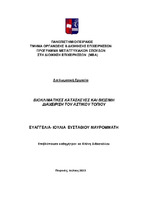Βιοκλιματικές κατασκευές και βιώσιμη διαχείριση του αστικού τοπίου

View/
Keywords
Αστικό τοπίο ; Βιώσιμη ανάπτυξη ; Βιοκλιματικός σχεδιασμός ; Παθητικό κτίριοAbstract
Nowadays, the limitation of earth's natural resources and excessive energy
consumption has led to environmental degradation. People's well being is
directly affected by the quality of the environment and it is obvious that nature
cannot be uninvolved in human activity. It is obvious that it is necessary to
search for new forms of energy that are more friendly to the environmentally. In
the construction sector, it is of great importance to adapt both the structures and
functions of the developments in order to develop an appropriate energy profile.
The creation of a specific type of building labeled "energy-efficient" would be a
powerful impetus to create a balanced relationship between technological
civilization and nature.
The aim of this paper is to present (through a case study), the bioclimatic
design techniques that can be applied in order to make the inhabitation of cities
and buildings as sustainable as possible, both from an environmental and
construction point of view.
In order to understand the above, we first present the main concepts that will
form the basis of the work, such as construction, sustainable construction,
circular economy and urban landscape. The concepts of urban landscape and
sustainable development are then presented and the basic principles and
objectives of sustainable development are analyzed. Next, references are made
to sustainable cities and their design, to the principles of sustainable urban
development and to the basic concepts, principles, methods, techniques and
tools related to the bioclimatic design of buildings, followed by a case study, in
which the energy and bioclimatic analysis of an existing residence in Athens, on
Philopappos Hill, is carried out and proposals are presented to make the
building energy sustainable.
Finally, the conclusion of the study is presented, which summarizes the fact,
that the efficient use of energy in residential buildings, offers multiple benefits:
- Reduction of energy consumption
- Improvement of thermal comfort conditions,
- Saving money on the family budget,
- Reduction of environmental pollution.


